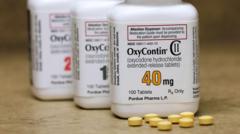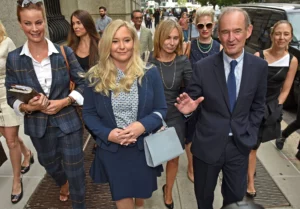Purdue Pharma has come to terms on a deal worth up to $7.4 billion to settle lawsuits connected to its opioid painkiller, OxyContin, which is widely viewed as a catalyst for the ongoing opioid epidemic in the United States.
Purdue Pharma and Sackler Family Reach $7.4 Billion Opioid Settlement

Purdue Pharma and Sackler Family Reach $7.4 Billion Opioid Settlement
A landmark agreement has been reached, settling the Sackler family's and Purdue Pharma's role in the opioid crisis with a significant financial payout.
Purdue Pharma and the Sackler family who controlled the company have announced a $7.4 billion settlement to resolve claims linked to the powerful painkiller OxyContin. This figure marks an increase of over $1 billion from a previous settlement proposal that the U.S. Supreme Court turned down in 2024. In this updated agreement, the Sackler family is expected to contribute up to $6.5 billion, while Purdue Pharma itself will pay $900 million.
The opioid crisis has been devastating, with OxyContin widely recognized as one of the most risky prescription medications that can lead users to stronger drugs, including heroin. As reported, the Sackler family accrued billions from the drug's sales. The New York Attorney General's office lauded the agreement, stating it would help fund programs for addiction treatment and prevention throughout the U.S.
Purdue noted in a statement, "We are extremely pleased that a new agreement has been reached that will deliver billions of dollars to compensate victims, abate the opioid crisis, and deliver treatment and overdose rescue medicines that will save lives." However, the settlement is still subject to court approval, and some details are still being finalized.
In this legal context, it is essential to note that under President Donald Trump’s administration, the federal government is reportedly not anticipated to oppose this new settlement. Connecticut Attorney General William Tong remarked that this agreement would bring some degree of closure to those affected by the opioid epidemic, despite emphasizing, "There is not enough money in the world to make it right."
Previously, a settlement proposal that had been rejected included provisions granting the Sacklers immunity from lawsuits in exchange for a $6 billion payment. Legislative details reveal that although the current injunction against lawsuits targeting Sackler family members will expire soon, a request has been submitted to the U.S. bankruptcy court to maintain it through February while final agreements are reached.
Survivors of opioid addiction have expressed mixed sentiments about the settlement; one woman, Kara Trainor, reflected on her recovery journey spanning 17 years stemming from a back injury and highlighted the ongoing impact of the pharmaceutical policies. She asserted, "Everything in my life is shaped by a company that put profits over human lives."
Since the availability of OxyContin in the late 1990s, the epidemic has escalated, leading to tens of thousands of annual deaths from opioid overdoses. Efforts to assess the Sackler family's financial dealings suggest they were aware of the burgeoning legal difficulties surrounding their actions and withdrew around $11 billion from the company prior to its bankruptcy proceedings.
The opioid crisis has been devastating, with OxyContin widely recognized as one of the most risky prescription medications that can lead users to stronger drugs, including heroin. As reported, the Sackler family accrued billions from the drug's sales. The New York Attorney General's office lauded the agreement, stating it would help fund programs for addiction treatment and prevention throughout the U.S.
Purdue noted in a statement, "We are extremely pleased that a new agreement has been reached that will deliver billions of dollars to compensate victims, abate the opioid crisis, and deliver treatment and overdose rescue medicines that will save lives." However, the settlement is still subject to court approval, and some details are still being finalized.
In this legal context, it is essential to note that under President Donald Trump’s administration, the federal government is reportedly not anticipated to oppose this new settlement. Connecticut Attorney General William Tong remarked that this agreement would bring some degree of closure to those affected by the opioid epidemic, despite emphasizing, "There is not enough money in the world to make it right."
Previously, a settlement proposal that had been rejected included provisions granting the Sacklers immunity from lawsuits in exchange for a $6 billion payment. Legislative details reveal that although the current injunction against lawsuits targeting Sackler family members will expire soon, a request has been submitted to the U.S. bankruptcy court to maintain it through February while final agreements are reached.
Survivors of opioid addiction have expressed mixed sentiments about the settlement; one woman, Kara Trainor, reflected on her recovery journey spanning 17 years stemming from a back injury and highlighted the ongoing impact of the pharmaceutical policies. She asserted, "Everything in my life is shaped by a company that put profits over human lives."
Since the availability of OxyContin in the late 1990s, the epidemic has escalated, leading to tens of thousands of annual deaths from opioid overdoses. Efforts to assess the Sackler family's financial dealings suggest they were aware of the burgeoning legal difficulties surrounding their actions and withdrew around $11 billion from the company prior to its bankruptcy proceedings.






















